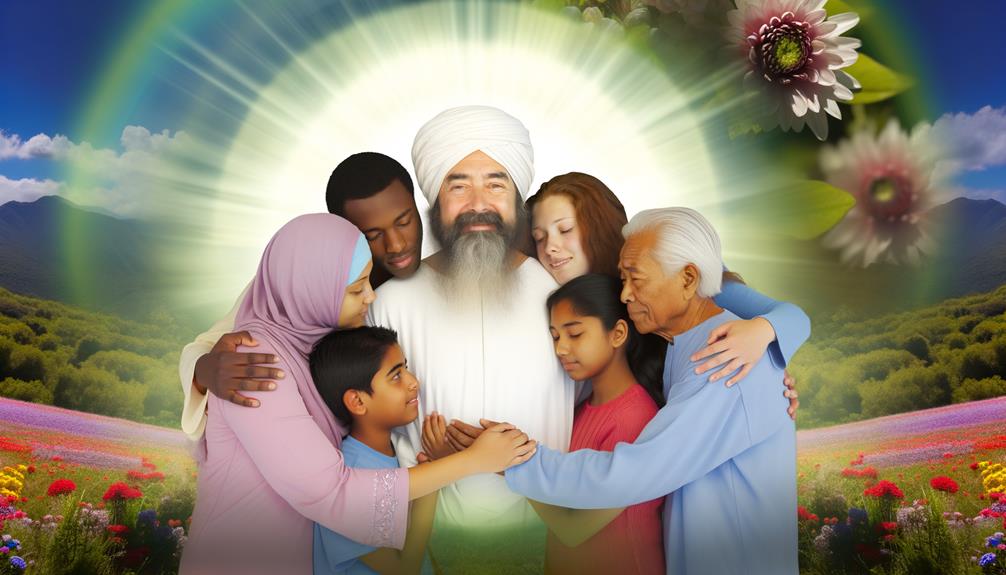Love in the Bible Meaning: Foundation of God’s Nature
As I explore the Bible, I see that love is multifaceted and deeply rooted in its teachings. Agape, or unconditional love, is exemplified by God’s sacrifice in John 3:16, calling for selflessness.
Philia, brotherly love, is highlighted by Jesus’ command in John 13:34-35, emphasizing unity and compassion. Storge represents familial love, as shown by Ruth’s loyalty to Naomi.
Eros, romantic love, is celebrated in the Song of Solomon, illustrating profound emotional and physical connections. Finally, Jesus’ teachings urge complete devotion to God and encompass compassion for all, including enemies, as stated in Matthew 5:44.
Understanding these nuances reveals much more.

Love in the Bible Meaning: Divine, Unconditional, and Transformative Love
| Type or Expression of Love | Biblical Reference | Meaning/Insight |
|---|---|---|
| God’s Unconditional Love | John 3:16 | God gave His Son out of deep love for humanity |
| Command to Love Others | Matthew 22:37-39 | Love God and your neighbor as the greatest commandments |
| Love as a Spiritual Fruit | Galatians 5:22 | Love is the first and foundational fruit of the Holy Spirit |
| Sacrificial Love | 1 John 4:10 | True love is shown through sacrifice, as God loved us first |
| Love in Action | 1 Corinthians 13:4-7 | Love is patient, kind, and enduring — not just a feeling |
Agape: Unconditional Love

Exploring the concept of agape in the Bible reveals an understanding of love that’s both selfless and unconditional, transcending human limitations.
When I examine passages like John 3:16, I see God’s agape love in action, offering His Son for humanity’s salvation. This type of love is sacrificial and expects nothing in return.
It’s evident in 1 Corinthians 13, where love is described as patient, kind, and devoid of envy or pride. This scriptural agape challenges me to embody a love that goes beyond mere feelings, urging me to serve others with a pure heart.
Philia: Brotherly Love

While agape represents an unconditional divine love, philia embodies the deep bond of brotherly affection that the Bible encourages among believers.
In John 13:34-35, Jesus commands us to love one another as He’s loved us, highlighting philia as essential for Christian community. This love is reciprocal, fostering mutual support and encouragement.
The friendship between David and Jonathan (1 Samuel 18:1-3) exemplifies philia, showcasing loyalty and deep emotional connection.
When I immerse myself in Scripture, I find philia calls me to prioritize others’ needs, cultivating a sense of unity and compassion.
It’s not just about shared interests but a commitment to spiritual and emotional well-being, reinforcing the collective strength of the faith community.
Storge: Familial Love

In the Bible, storge signifies the natural affection and bond that exists within families, embodying the love between parents and children, siblings, and extended kin. This familial love is evident in several scriptural instances.
- Noah’s Ark: Noah’s unwavering commitment to his family’s safety exemplifies storge, as he follows God’s command to build the ark (Genesis 6:18).
- Ruth and Naomi: Ruth’s loyalty to her mother-in-law Naomi underscores the depth of familial bonds (Ruth 1:16-17).
- Joseph and His Brothers: Despite their betrayal, Joseph’s forgiveness and provision for his brothers during famine reveal storge (Genesis 45:4-15).
In these narratives, familial love is a powerful force, fostering unity, forgiveness, and support within the family unit.
Eros: Romantic Love

Eros, representing romantic love, is depicted in the Bible through the passionate and intimate relationship between Solomon and the Shulammite woman in the Song of Solomon. This book poetically celebrates the depth of romantic attraction, physical desire, and emotional connection. It illustrates the sanctity of marital love, highlighting the divinely ordained bond between husband and wife.
| Verse | Description | Theme |
|---|---|---|
| Song of Solomon 1:2 | “Let him kiss me with the kisses of his mouth!” | Desire and affection |
| Song of Solomon 2:16 | “My beloved is mine, and I am his” | Possessive love |
| Song of Solomon 4:7 | “You are altogether beautiful, my love” | Admiration and beauty |
| Song of Solomon 6:3 | “I am my beloved’s and my beloved is mine” | Mutual belonging |
| Song of Solomon 8:7 | “Many waters cannot quench love” | Unquenchable love |
Love in Jesus’ Teachings

The teachings of Jesus elevate love to its highest form, emphasizing selflessness, compassion, and the love of God and neighbor as the foundation of moral and spiritual life. His directives are profoundly encapsulated in the Great Commandments:
- Love God: Jesus instructs us to love God with all our heart, soul, and mind (Matthew 22:37). This love demands complete devotion and prioritization of divine will.
- Love Your Neighbor: Extending beyond mere affection, Jesus calls for loving others as ourselves (Matthew 22:39), embodying empathy, kindness, and self-sacrifice.
- Love Your Enemies: Radical in its demand, Jesus’ teaching to love one’s enemies (Matthew 5:44) compels us to transcend personal grievances and embody divine grace.
In these teachings, Jesus redefines love, urging us toward an all-encompassing compassion.
Conclusion
In exploring the multifaceted concept of love in the Bible—Agape, Philia, Storge, and Eros—it’s clear that love isn’t just an emotion but a divine mandate. Each type of love serves a unique purpose, reflecting God’s nature and His intentions for humanity. True love in biblical context transcends mere feelings; it is an active choice that compels individuals to serve, sacrifice, and nurture one another, reinforcing the idea that love is foundational to faith and community.
Jesus’ teachings encapsulate this; He proclaimed, ‘Love one another as I’ve loved you’ (John 13:34).
Isn’t it profound that every form of love ultimately points us back to God’s unconditional love?
By embodying these loves, we fulfill the greatest commandment and reflect the divine nature within us.






